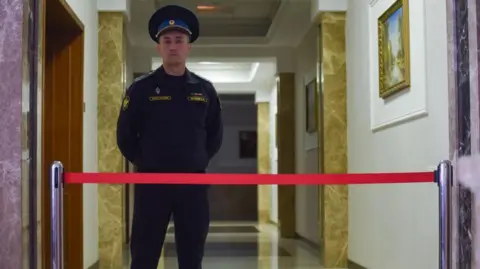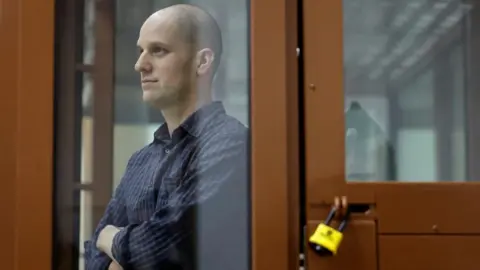US reporter's secretive 'sham' trial in Russia nears end
 EPA-EFE/REX/Shutterstock
EPA-EFE/REX/Shutterstock I’m at the Sverdlovsk Regional Courthouse in Yekaterinburg, just metres away from Courtroom 5A where US journalist Evan Gershkovich is on trial.
The Wall Street Journal reporter, who’s 32, is facing espionage charges, rejected by him, his employers and the White House.
He’s the first Western journalist on trial for spying since the Cold War.
But I’ll be honest with you: I have little sense of what’s happening inside that room. Evan’s trial is being held behind closed doors.
That means no media, no friends and family, no diplomats, no members of the public allowed in.
The journalists here are having to rely on snippets through the day from the court press secretary:
“The court’s taking a 15-minute break.”
“The hearing has resumed.”
“The hearing is over for the day.”
When the hearing ends, the press secretary announces that proceedings will resume tomorrow, Friday, with closing arguments.
It feels like the end of this trial is near.
Evan Gershkovich’s employer has denounced this as a “sham trial”.
“This bogus accusation of espionage will inevitably lead to a bogus conviction for an innocent man who would then face up to 20 years in prison for simply doing his job,” The Wall Street Journal’s editor-in-chief Emma Tucker wrote last month.
Russian security services claim that Mr Gershkovich was gathering classified information about a Russian defence plant near Yekaterinburg and spying for the CIA.
Evan, his newspaper and the US government fiercely reject the accusation. The WSJ has accused Russia of “stockpiling Americans” to trade them for Russians jailed abroad.
 REUTERS/Evgenia Novozhenina
REUTERS/Evgenia NovozheninaReferring to American citizens arrested in Russia, this week the US ambassador to the United Nations accused President Vladimir Putin of “treating human beings as bargaining chips”.
Evan Gershkovich’s trial began last month. Thursday's hearing, the second, had been scheduled for 13 August.
Suddenly everything’s speeded up. In an unexpected move, the court brought the hearing forward to Thursday.
We’ve been allowed inside the courthouse and are close to the courtroom.
Not too close, though, The corridor leading to 5A has been cordoned off and a masked police officer is on guard to make sure we don’t get any nearer. A court official has instructed us to stay right here.
At one point we, the BBC, become the centre of attention.
“May I take a photo of you for my news outlet?” a local journalist asks me.
“If it’s OK with you I’d rather you didn’t,” I reply, “but thank you for checking first”.
“No problem,” he replies, before proceeding to take lots of photos of me and posting online. Within minutes local and national news sites are reporting that the BBC is here at the courthouse.
We sit waiting for news from 5A. Every so often, Mr Gershkovich's defence lawyer exits the courtroom and walks past. But she won’t take questions.
More waiting. Suddenly a local lawmaker strides down the corridor and heads for the exit. This is the man who had told Russian state media that he had met Evan Gershkovich during the journalist’s reporting trip to Yekaterinburg.
So, after just two court hearings, it feels as if we’re nearing the end.
And then what?
If, as expected, the judge declares Mr Gershkovich guilty, the maximum possible sentence is 20 years in a penal colony.
But Moscow has indicated it may be open to doing a deal with the Americans to release him.
The Russians barely hide the fact that they view a jailed American as currency, as a bargaining chip, as an opportunity to extract one of their own from a foreign jail.
Moscow knows that America is prepared to undertake prisoner swaps in order to release its own citizens.
We know Russia and America have been discussing the possibility. We also know that Donald Trump has boasted that he’s the man to secure Mr Gershkovich's release.
So, have Moscow and Washington done some kind of deal to bring Evan home?
Watch this space.
